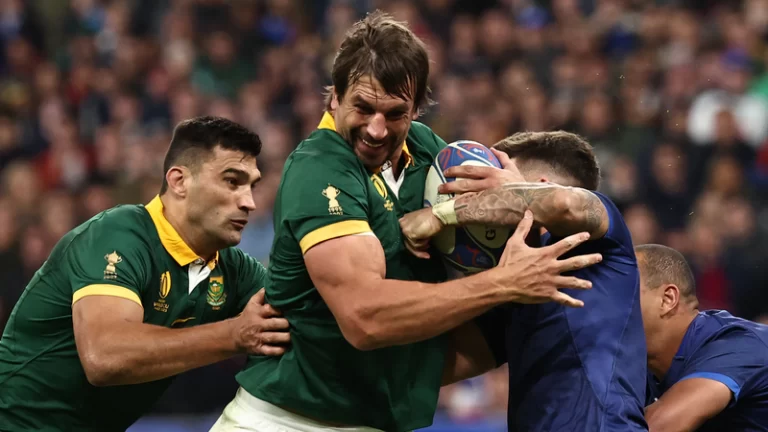None of the numerous Springboks who raised their hands during Sunday’s exciting victory over France in Paris was more crucial or appropriate than experienced lock forward Eben Etzebeth.
The 31-year-old was an integral part of numerous crucial plays that handed South Africa the Rugby World Cup quarterfinal victory and caused the predominantly French home crowd to boo and whistle at their new pantomime villain.
The most important part of his game-changing try, which came 13 minutes from the end, was that he lived up to Victor Matfield’s assessment that Etzebeth was “probably the best player in the world” by playing a significant role in the battles that changed the balance.
With him on the 2019 World Cup winning team, Francois Louw noted that “stalwart” Etzebeth is essential to the Boks.
“I think all teams have an enforcer, someone that brings that physicality and that role has changed so much over the years,” he told reporters on Tuesday.
“Those players are getting better and better; they’re not simply big brutes anymore; they play really good rugby.
“Over time, he improved his game. He’s a tough guy and when he initially entered the international stage, he came out swinging.
He has done an outstanding job of controlling that aggression and channeling it toward a goal that is more beneficial for the team.
“His influence in the victory (against France) was immense.”
At the start of the game, with France ahead 7-0 and approaching the South African tryline, Etzebeth’s enormous right paw made a significant and contentious intervention.
Ben O’Keeffe, the referee, and the TMO team all agreed that he had somehow palmed the ball backwards, prompting the home crowd to boo and shout for a deliberate knock-on.
Moments later, the Sharks’ forward was vying for a high ball in midfield when Kurt-Lee Arendse received a lucky bounce, allowing the wing to squeak through for the Boks’ first try, which tied the game.
A head-on collision between Etzebeth and Uini Atonio just before halftime resulted in Etzebeth receiving a yellow card rather than a red one, which infuriated the French section of the Paris fans who may not have been well-versed in the idea that bent knees provide “mitigating circumstances” in the tackle.
Etzebeth was the player who recovered the ball from a ruck 10 meters from the French line late in the game when the Springboks were trailing 25-19. He then barged and bullied his way through the tackles of Matthieu Jalibert, Thomas Ramos, and Pierre Bourgarit.
The enraged green giant swatting the flies was another pantomime moment. This time, the French were silent in wonder rather than hissing.
The Boks took the lead after Etzebeth’s try, which Handre Pollard successfully extrapolated, and never looked back. Their 29-28 victory advanced them to the semi-final against England the following Saturday.
‘Powerhouse’
Etzebeth, who won his first cap against England in 2012 and stands 2.04 meters tall and weighs 119 kg, will earn his 118th cap on Saturday in Paris, leaving him only nine short of Matfield’s South Africa record of 127.
Before the pool match against Ireland, Matfield remarked, “Eben is the heart of the pack.”
When you consider the physicality he brings to the mauls, in the thick of it, halting mauls, etc., he comes off as the powerhouse.
“He’s also got an engine and he never stops.”
In 2019, the year he won the World Cup with the Boks, he made headlines off the field when he and his cousin were charged with violence and using racist slurs in a Langebaan incident.
No charges were ever filed against Etzebeth, and the case was never brought to court, but the case surely damaged his reputation since “no smoke without fire.”
This year, he overcame a shoulder injury, but in July, he experienced another devastating personal crisis when his father, Harry, passed away from cancer. A few days later, in Auckland, he led his team out as captain in Siya Kolisi’s absence.
The path has been one of amazing endurance and consistency in high performance.
The Boks will be praying that their “enforcer” keeps going, at least until he is wearing a second medal of victory around his neck.
